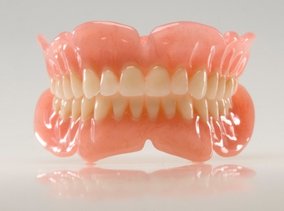 Dentures are a replacement for missing teeth that can be removed and put back into your mouth as you please. Dentures can be full or partial coverage depending on your need. Full dentures are used when all of the natural teeth are removed from the mouth and replaced with a full set of dentures. There are two types of full dentures.
Dentures are a replacement for missing teeth that can be removed and put back into your mouth as you please. Dentures can be full or partial coverage depending on your need. Full dentures are used when all of the natural teeth are removed from the mouth and replaced with a full set of dentures. There are two types of full dentures.
- Conventional Full Dentures – This is when all the teeth are removed and the tissue is given time to heal before the dentures are placed. It could take a few months for the gum tissue to heal completely, and during this time you will be without teeth. These are also made if you are replacing your current full dentures with new ones.
- Immediate Full Dentures – Prior to having your teeth removed, Dr. Eggert takes measurements and has dentures fitted for your mouth. After removing the teeth, the dentures are immediately placed in your mouth. The benefit is that you do not have to spend any time without teeth. You will, however, need to have many follow up visits to adjust your dentures. After 6 months to a year, you will also want to have your denture relined because the jaw bone will change shape as your mouth heals after your tooth extractions.
Partial dentures are another option when not all of your teeth are missing. This is similar to a bridge, but it is not fixed to your other teeth and can be removed from your mouth.
Your dentures may take some time to get used to. The flesh colored base of the dentures is placed over your gums. Some people say that it feels bulky or that they don’t have enough room for their tongue. Other times the dentures might feel loose. These feelings will affect the way you eat and talk. Over time, your mouth becomes trained to eat and speak with your dentures. They may never feel like your natural teeth, but they are much better than the alternative of not having teeth and they look esthetic.
Even though dentures are not real teeth, you should care for them like they are. You should brush them to remove plaque and food particles. You should take your dentures out every night and not sleep with them. You should store them in room temperature water or a denture cleaning solution. Do not use hot water because it could warp the dentures. Your dentures are delicate, so make sure you are careful when handling them so you don’t drop them. Also, never try to adjust your dentures yourself. You could ruin them, so you should always seek assistance from Dr. Eggert if they feel uncomfortable or loose.
